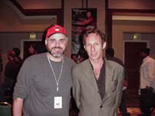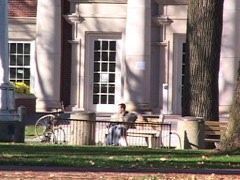Entrepreneur Brian Austin Whitney '86 Gives Independent Musicians New Muscle
April 11, 2002
 April 11, 2002, Greencastle, Ind. - "The biggest weakness independent artists have is we're not very organized," according to Brian Austin Whitney, the founder of Just Plain Folks, a coalition of independent musicians, singers and songwriters, and a 1986 graduate of DePauw University. Whitney, seen in the photo at top with Krist Novoselic of Nirvana, tells the Indianapolis Business Journal, "What we're doing is building an informal career ladder for members, actively working to develop artists."
April 11, 2002, Greencastle, Ind. - "The biggest weakness independent artists have is we're not very organized," according to Brian Austin Whitney, the founder of Just Plain Folks, a coalition of independent musicians, singers and songwriters, and a 1986 graduate of DePauw University. Whitney, seen in the photo at top with Krist Novoselic of Nirvana, tells the Indianapolis Business Journal, "What we're doing is building an informal career ladder for members, actively working to develop artists."
Whitney has created a community of more than 17,000 independent musicians and songwriters, who receive Just Plain Folks e-mail newsletters at least once a month. There's also a web site, accessible here. Radio Free Virgin, an online music network (click here), now has a Just Plain Folks channel. And Just Plain Folks' annual music awards have drawn 100,000 entries from artists in fifty states and fifty countries. The DePauw alum's efforts have made him a major player in the burgeoning  independent music scene, and have brought him publicity from the Wall Street Journal, Chicago Tribune and other media outlets. IBJ notes, "And all this was made possible from an east-side basement office on Butler Avenue. Behold the power of the Internet." But the roots of Just Plain Folks can be traced back to Whitney's college days (the photo above at right shows Whitney with Mark Cuban, owner of the Dallas Mavericks and founder of Broadcast.com).
independent music scene, and have brought him publicity from the Wall Street Journal, Chicago Tribune and other media outlets. IBJ notes, "And all this was made possible from an east-side basement office on Butler Avenue. Behold the power of the Internet." But the roots of Just Plain Folks can be traced back to Whitney's college days (the photo above at right shows Whitney with Mark Cuban, owner of the Dallas Mavericks and founder of Broadcast.com).
Whitney, who lettered in football while at DePauw, also spent a lot of time working on campus theatre projects. "Though I was involved in quite a few productions both on stage and behind the scenes, I was always an outsider to the established 'clique' that evolved around the central theater students at the time," Whitney tells DePauw.edu. "I had written a play called Random Chauvinistic Thoughts About Freshman Girls which was based on my (work study) experience as a night receptionist at Rector Hall. It was a comedy and actually wasn't chauvinistic in the least"  (photo at left shows Whitney and Radio Free Virgin vice president of technology Brendon Cassidy).
(photo at left shows Whitney and Radio Free Virgin vice president of technology Brendon Cassidy).
Still, Whitney says the title did create controversy, and he responded to it by staging the show himself, "casting all 'clique' outsiders... mostly first time DePauw theatrical actors." He continues, "In the end, we weren't the establishment. We were just talented and deserving artists. We were Just Plain Folks. The concept was born. I used that name for all the press and programs and everything we did. Just Plain Folks was about giving equal opportunity to everyone, including the deserving outsiders. We do the same thing with musicians and writers today."
Whitney says, "It was the first show for many of the actors involved, and the only for many, but an important life long opportunity for everyone. It was the first show for Katie Hersberger, one of the female leads and she went on to appear in TV shows and soap operas after college. Our reviews were very positive and there were some additional editorials as well. Sure, it wasn't Shakespeare, but it was exactly what college is supposed to be about. It was an opportunity to test the water and an opportunity to be in the game with the "big" boys and prove ourselves. And collectively, on that May weekend at DePauw, we did. Just Plain Folks."
long opportunity for everyone. It was the first show for Katie Hersberger, one of the female leads and she went on to appear in TV shows and soap operas after college. Our reviews were very positive and there were some additional editorials as well. Sure, it wasn't Shakespeare, but it was exactly what college is supposed to be about. It was an opportunity to test the water and an opportunity to be in the game with the "big" boys and prove ourselves. And collectively, on that May weekend at DePauw, we did. Just Plain Folks."
But it took 12 years for Whitney's idea to reach its present form. IBJ writes, "Whitney didn't have grand ambitions when he left a job at a Fort Wayne music retailer in 1998. The DePauw University graduate decided to take three months off and hatched what he calls a wacky idea: He contacted 100 songwriters across the country-one male and one female in each state. He planned to travel the country, spending time with each one, writing and performing just for the fun of it (photo at left shows Whitney with Golden Globe nominee and solo artist David Baerwald). 'It was basically an excuse for a really cool vacation,' Whitney said. Almost two-thirds of the 100 artists responded to his initial query. Most offered him a place to stay. But a funny thing happened before he even hit the road. His songwriting brethren started e-mailing him questions about songwriting and publishing. He responded with a newsletter. And Just Plain Folks was born."
just for the fun of it (photo at left shows Whitney with Golden Globe nominee and solo artist David Baerwald). 'It was basically an excuse for a really cool vacation,' Whitney said. Almost two-thirds of the 100 artists responded to his initial query. Most offered him a place to stay. But a funny thing happened before he even hit the road. His songwriting brethren started e-mailing him questions about songwriting and publishing. He responded with a newsletter. And Just Plain Folks was born."
Whitney tells today's DePauw students, "College is a petri dish for trying things out. What I learned (and never forgot) from my Just Plain Folks theatrical experience was that if you are passionate about something, you can make it happen outside of the box. Most things in life happen because a very small number of individuals with a passionate vision and goal simply go for it. I had a lot of opportunities to test the waters with many things at DePauw. I was a 4 year letterman on the football team, I wrestled, was on the track team one year, I was in  or involved with over a dozen theater productions, I worked at the radio station, on the newspaper and did a myriad of things I was curious about and DePauw offered access to try those things out." He adds that as a college student, "you can make mistakes with far less consequences than you can afterwards. I think if I had a chance to give advice to current students, I would suggest leaving no idea or creative impulse on the table. Get it out there. Stick your neck out every chance you can get. If you are passionate about what you are doing it will be rare that your neck will get chopped off and even if it did, what you will have learned will serve you very well going forward. Most failures in business come from folks afraid to take any risk. College is the greatest practice field for this vital business ability."
or involved with over a dozen theater productions, I worked at the radio station, on the newspaper and did a myriad of things I was curious about and DePauw offered access to try those things out." He adds that as a college student, "you can make mistakes with far less consequences than you can afterwards. I think if I had a chance to give advice to current students, I would suggest leaving no idea or creative impulse on the table. Get it out there. Stick your neck out every chance you can get. If you are passionate about what you are doing it will be rare that your neck will get chopped off and even if it did, what you will have learned will serve you very well going forward. Most failures in business come from folks afraid to take any risk. College is the greatest practice field for this vital business ability."
Looking at the future of the music business, the DePauw alumnus says, "The corporate music industry is in crisis. They finally openly admit that themselves, though many of us have been saying it for a long time. Because of the technological advances on the net, the major labels can no longer control the distribution channels, marketing  outreach and airplay as they could in the terrestrial world. There is a finite amount of time on a radio station (and number of stations), a finite amount of shelf space in a record store (and number of stores) and a small number of mega conglomerates who can afford the marketing budgets it takes to launch a single or promote an artist in conventional mediums... The industry can no longer survive with a 90% failure rate. I see the next phase of success being a shift to much smaller niche market artists who thrive on selling 50,000 to 150,000 albums. It seems to me that the principles learned by the majors on what makes an album successful can be adapted to support 1000 artists selling 100,000 albums profitably instead of 20 artists trying to support the entire industry selling 5-10,000,000 albums each. The talent is clearly out there."
outreach and airplay as they could in the terrestrial world. There is a finite amount of time on a radio station (and number of stations), a finite amount of shelf space in a record store (and number of stores) and a small number of mega conglomerates who can afford the marketing budgets it takes to launch a single or promote an artist in conventional mediums... The industry can no longer survive with a 90% failure rate. I see the next phase of success being a shift to much smaller niche market artists who thrive on selling 50,000 to 150,000 albums. It seems to me that the principles learned by the majors on what makes an album successful can be adapted to support 1000 artists selling 100,000 albums profitably instead of 20 artists trying to support the entire industry selling 5-10,000,000 albums each. The talent is clearly out there."
Just Plain Folks, Whitney states, is "focusing more and more on developing this talent base and a possible career ladder for them. Developing artists is a lost art at the majors. If the industry stays exactly as is, there's no question that a percentage of our members will become the next group of elite artists in the major system alone. Our hope is to reach out to anyone in the music industry, including those at the major labels who are enlightened, to stop some of the infighting that is going on and really work to solve the REAL problems we all face together. That includes the devaluation of music by file sharing, the lack of access to insurance and other benefits that nearly every other career path in every other creative or non creative endeavor offers, a change to stop wasting vast resources on outmoded business models and instead work with the community to put those dollars to a more profitable and beneficial use for all parties involved. It can all be done and Just Plain Folks is in the center of this concept and movement."
insurance and other benefits that nearly every other career path in every other creative or non creative endeavor offers, a change to stop wasting vast resources on outmoded business models and instead work with the community to put those dollars to a more profitable and beneficial use for all parties involved. It can all be done and Just Plain Folks is in the center of this concept and movement."
